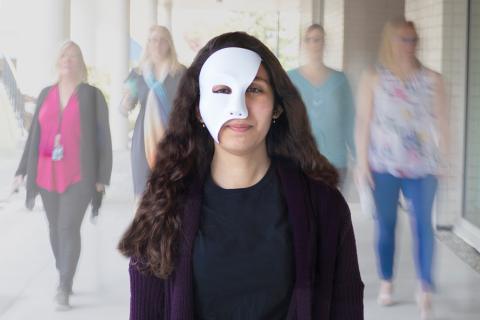In any given year in Canada, one in five people will personally experience a mental health issue or illness, according to the Canadian Mental Health Association. Yet, despite how common this experience is, almost one-half of those people who feel they have suffered from depression or anxiety never go to see a doctor about it. Three VIU students speak out about their experiences.
by Rae-Anne Guenther
Our minds can act like a broken record; stuck on a bad thought pattern that continues to loop – over and over again. Even when you want to change the song, the melody is stuck on repeat. When you are “in it,” it can seem that you will never get out and that nobody except you can do anything about it.
“I felt like I had this dark cloud hanging over me all the time,” says Avery Snider, a VIU Sport, Health and Physical Education (SHAPE) student. “I didn’t realize that I was struggling with depression and that I should talk to someone about it.”

“I was struggling in silence, which just made all my emotions build up over the years,” she says. “I thought I could just push through those emotions and they would go away on their own.”
But those emotions didn’t disappear – instead, they amplified after a difficult break-up last summer, and Snider found herself forced to finally confront what she had been avoiding for years. She began isolating herself from her friends and getting out of bed in the mornings started to seem impossible. Basketball, which was once the centre of her universe, became the last thing she wanted to do.
“I kept telling myself it was just a break-up – everyone goes through them, so why should I be so upset?” she says. “But after years of holding everything in, eventually it exploded emotionally in me.”
Reaching out
Snider started by calling the Vancouver Island Crisis Hotline and accessing the counsellors at VIU.
“Talking to strangers was a bit of a safety net for me, because they didn’t hold any judgement towards me and didn’t have any biases. All they did was listen,” she says. “The counsellors at VIU really helped me get through when I was feeling extremely low.”
VIU’s Health and Wellness Centre provides a variety of services and information for students including medical services, individual counselling, wellness groups, workshops and connection to other resources. Health and Wellness services are available in Building 200 (Student Affairs) on the third floor, or by calling 250.740.6416 for counselling services or 250.740.6620 for the medical clinic.
“The most important message we can send to our students is that you are not alone,” says Bryan Tinlin, Director of Student Services. “Our counsellors offer safe, professional and confidential services to enrolled VIU students. They collaborate with students in a compassionate setting to clarify concerns, establish goals and explore resources for well-being. They offer a variety of services which can assist in the management of personal challenges, allowing students to have the best university experience possible.”
Eventually, Snider found the courage to open up to her family and friends, and the response was heartening. Her parents – now the first people she calls when she is feeling overwhelmed – would drive down from the Comox Valley after work to spend the night so she wasn’t alone with her thoughts. Snider’s basketball coach, Tony Bryce, told her the last thing he was worried about was her attending basketball practice and that the team was there
to support her in any way she needed.
“We had a really emotional talk about my struggles, and he shared with me that he had his own personal struggles at my age,” she says. “It made me realize that we all struggle and that it doesn’t mean this is the end of the world. Relating with someone made me feel less alone.”
By sharing her story, Snider’s struggles suddenly didn’t seem so big and never-ending. Opening up about her feelings also led to opportunities for more supports. One of her VIU professors referred her to a therapist, with whom she continues to work.

His most important advice to others struggling is to not keep it bottled up inside. “If you talk about your struggles, you will feel better. Sharing your challenges puts everything into perspective and gives you the clarity to work through those issues,” he says.
Obradovich has struggled with his own mental health challenges since immigrating from Croatia to attend university. Arriving in a new country with no support or connection to anyone, added with the stress of juggling a full-time job, sports and studies, got overwhelming for him.
“My schedule was so hectic that it was hard to take time to slow down,” he says. “I would find myself having a break down every three months or so when my emotions would catch up to me. I’ve found that doing yoga or meditating is really important to re-setting my mind.”
Our mental health – arguably the most important asset we have – is often overlooked as it’s easy to ignore something we can’t physically see. It can often take the back burner when work, school or other commitments are demanding our attention. But as Snider has realized, if you continue to ignore your feelings, eventually they will come to the surface. “I wish I had done something about it earlier, but I am happy I have now reached out for support,” she says. “If you notice that you are not feeling yourself and are struggling, the best thing you can do for yourself is seek supports as quickly as possible. We can’t do this alone.”

Sidebar: Show Support
When we see someone we care about struggling, our instinct is to support them. How we provide that support makes an impact. Here are some tips on how to be supportive in a positive way:
BE AVAILABLE. Let them know they are not alone and express your sympathy.
LISTEN. Let the person talk openly without hearing advice or dismissal of their thoughts and feelings. Do not share it with others, except if they talk about suicide – contact professional help when suicidal thoughts are voiced.
ASK WHAT THEY NEED, don’t do what you feel they need.
REASSURE THEM THAT YOU CARE ABOUT THEM. It can be a comfort just to know there are people who care.
Sidebar: Accessing services
On-Campus
Counselling Services: 250.740.6416, services.viu.ca/counselling
Campus Security (Nanaimo): 250.740.6600
Know More campaign: viu.ca/know-more
Off-Campus
Vancouver Island Crisis Line: 1.888.494.3888
Sexual Assault Response Program: 250.756.2452
Sidebar: Help to heal
Feeling safe is a basic human need, and without it, fear can take over any or all aspects of a person’s physical and mental health. That trauma will look different for everyone. For Ashley Smith*, not feeling safe in her own skin amplified her sleep problems.
The summer after high school graduation, Smith was sexually assaulted at a friend’s house party. Unable to cope or open up about the incident, her sleep issues heightened.
“Whenever I would go to bed at night, I would wake up in terror,” she says. “I already had sleeping issues before this, so I didn’t correlate the trauma with my lack of sleep.”
Smith thought she left behind her scars when she moved from her hometown in Ontario to British Columbia to start over at VIU. For a while, things were getting a lot better. Her sleep was improving and she felt comfortable enough to open up to a close male friend about her past.
“I came to really trust him and felt I could open up about what happened to me,” she says. But one night after crashing at his place, she woke up to uninvited hands on her body.
“That broke me. After everything I had already gone through and then to have my boundaries violated once again,” she says.
This is when sleep became non-existent. Smith would go a week without sleep and ended up passing out in her morning class. Struggling to keep up with her studies and fearing being labelled a failure by family members, Smith didn’t know where to turn. She finally talked to her parents about her situation, and her mother suggested seeking out support services at VIU.
“I started accessing the counselling services at VIU and they helped me get a late withdrawal from one of my classes,” Smith says. “The counsellors gave me options to apply for temporary disability, how I could report my offender or take further action. They give you all the knowledge you need to make an informed decision.”
The counsellors gave her coping strategies and time management exercises. Her teacher was understanding about the process, and didn’t question her reasons for withdrawing. Thanks to the support services offered by VIU, Smith is now retaking the course and managing her sleep issues and trauma.
“The biggest thing for me is that I feel I am the school’s child. The counsellors, clinic staff and academic advisors are all part of my family and provide that safe spot for me. With their support, I was able to get through the trauma and begin to heal.”
*Name has been changed to protect the privacy of the student.





